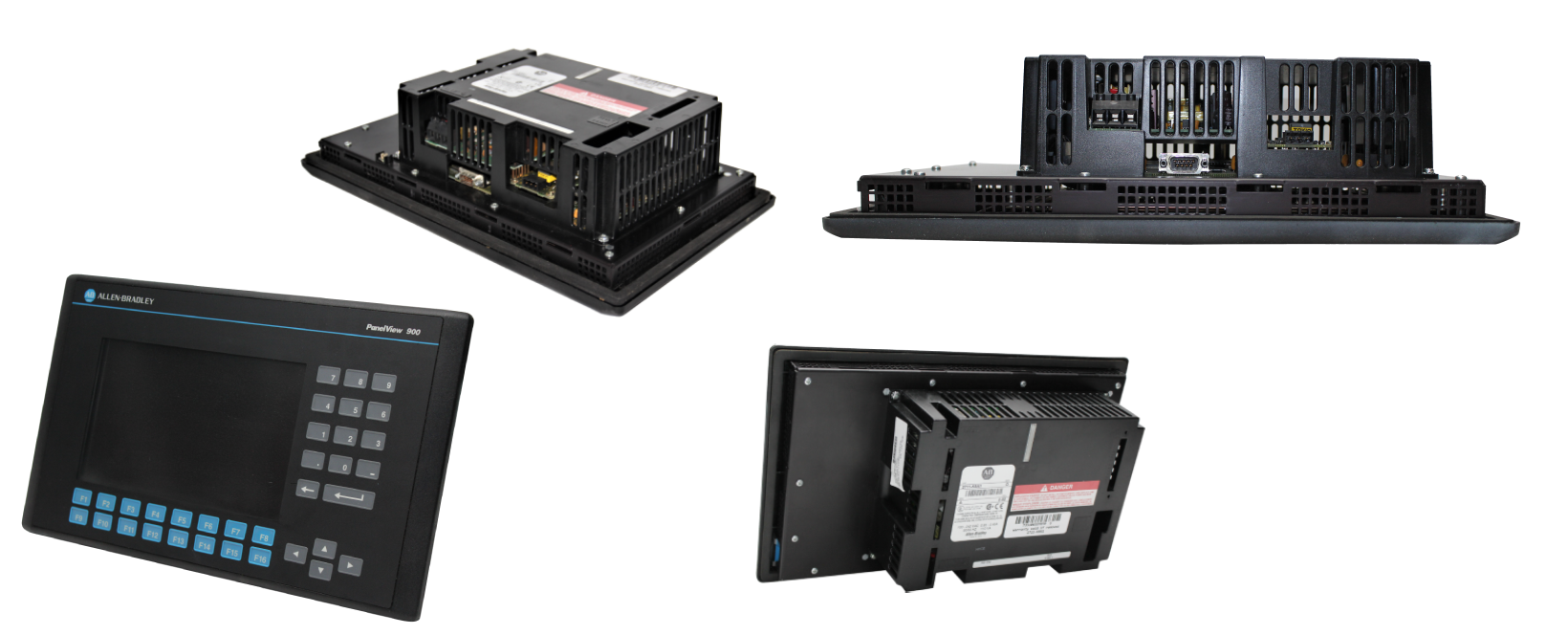PanelView 900 Selection Guide
In the world of Industrial Automation, we often find Programmable Logic Controllers, also known as PLCs. PLCs are the modern-day, industrial-grade computers and controllers that handle process automation tasks in many fields. Starting from small-scale solar controllers and irrigation systems, PLCs have made their way into large-scale mass manufacturing industries including automotive and even aerospace.
Similar to a personal computer, PLC-based automation systems can handle a variety of tasks depending on their programming. PLCs are used in both fully automated processes and semi-automatic actions that require occasional or periodic manual intervention.
The word ‘computer’ immediately creates a picture in our mind that has a control unit, some input outputs, and most importantly, a display. Similar to a computer monitor, industrial automation systems also have a counterpart named ‘HMI’; a Human-Machine Interface. HMIs are also called ‘Operator Terminal’, ‘Man-Machine Interface’, and even ‘Local Operator Interface’.
An HMI can be considered a device more than just a display or a touch-enabled display. It acts as the bridge between the user and the automated system to take inputs and display any parameters. They can display graphs, graphics, and text elements to visualize information that is often used to monitor process parameters and the current state of the machine(s). However, most HMIs do not record any information, but rather act as a communication tool to bridge the gap between the digital and human world.
HMIs are manufactured by a large number of manufacturers. The list includes Siemens, Allen Bradley (now Rockwell Automation), ABB, Honeywell, Schneider, Mitsubishi, and many more. However, HMIs are not just limited to PLC manufacturers, companies such as Nextion have also started manufacturing HMIs to interface with computers other than PLCs such as Raspberry Pis and Arduinos.
One such popular HMI solution is the Allen Bradley Panel View Series 900 control panels. Released in 1996, the PanelView series control panels have been immensely popular in industrial automation systems, especially those which utilize Allen Bradley PLCs.
Unfortunately, the PanelView series has been discontinued as of now and has been replaced by the PanelView Plus series. However, for the sake of those who are interested, this article intends to discuss the specifics to consider when selecting a PanelView Series 900 graphic terminal.
PanelView 900 Terminal Types
Allen Bradey offers two types of PanelView 900 series graphic terminals. One type consists of a non-touch display with a series of button inputs (Keypad Terminal), while the other features a full touch-screen display without any physical buttons (Touchscreen Terminal). Each terminal regardless of the type can have a display in monochrome, grayscale, or color. Depending on the options, some models can have both buttons and touch screen inputs.
PanelView 900 Keypad Terminal
The keypad terminal consists of 16 function keys, which may or may not have a custom legend depending on the OEM customizations. These keys can be programmed to initiate functions on the terminal display.
There are 4 cursor keys (up, down, left, and right) to navigate through menus displayed on the display. At the top of the cursors, there is a numeric keypad with a decimal point, negative, backspace, and return buttons.
PanelView 900 touch Screen Terminal
The touch screen terminal type consists of a grid that has 384 total touch cells. These cells are the smallest areas of touch-sensitive areas that can distinguish an input. This is a grid of 24x16 where interactive objects such as graphic push buttons are aligned with each cell to detect touch events.
Touching a certain cell in a PanelView 900 touch screen terminal initiates the function of the displayed object (i.e., Push button). These functions need to be pre-defined when the application for the terminal is being created.
PanelView 900 Technical Specifications
This series of graphic terminals are available in a multitude of peripherals. This includes a variety of communication interfaces such as RS232, ControlNet, DeviceNet, DH-485, and Remote I/O.
The programming of a PanelView 900 graphic terminal is carried out through the DH-485 (9) programming connector, which is used to transfer programs to the terminal. There is also another DH-485 connector with a different connector that is compatible with SLC or MicroLogix controllers and DH-485 networks. The unit can also be powered through this connector using a wall mount power supply that has the same type of connector. Most models include an RS-232 printer port that can be used to directly connect a printer to the terminal or
In addition to the communication ports, there are a few features that are available on each PanelView 900 terminal that is accessible in the back panel. On each terminal’s back, there is a power terminal, a nameplate label, a reset button, a memory card slot, and two indicator LEDs are available. The LEDs consist of one red LED that indicates a firmware or a hardware fault, and a green LED that indicates any communication activity.
How to Select a PanelView 900 Graphic Terminal
As mentioned above, there is a range of PanelView 900 graphic terminals offered by Allen Bradley. Therefore, selecting the best fit for your project can be confusing at first. Here are some key factors to consider when selecting an HMI for an industrial automation project:
User Interface
When selecting an HMI, the user experience should play a key role. The most important part of the user experience is how the information is presented to the user. For applications that require the indication of graphical content such as images/icons, the PanelView 900 color display terminals can be a better choice.
For applications that do not require such graphical indications to be displayed, the monochrome type displays can be used.
The PanelView 900M series has an AC gas plasma type display that has a resolution of 640x400 pixels. The touch variant has a touch-sensitive grid of 24x16, where each touch cell is 26x25 pixels large. The 900C series comes with a TFT display with a cold cathode fluorescent (CFC) backlight. Its resolution is 640x480 and has the same touch grid where applicable.
User Interaction Method
PanelView 900 series graphic terminals come in two interaction configurations, one being a fully touch-sensitive display with no physical buttons and the other with a non-touch sensitive display with a set of physical membrane keys.
The touch display can be customized through the software to have any type of graphic input such as buttons or icons. Terminals that have a catalog number starting with 2711-T9C or 2711-T9A are all touch-input terminals.
The keypad model comes equipped with 16 function buttons. Although their legend is fixed, it can be customized by the OEM at the time of purchase. These buttons can be mapped within the software to provide user inputs to the PLC program. Keypad input terminals belong to the catalog number starting from 2711-K9C or 2711-K9A.
Memory
For storing the information and the application, PanelView 900M and 900C series terminals have 240 kilobytes and 1008 kilobytes of flash memory, respectively.
Power Supply
PanelView 900 series HMIs come in different models that can be powered using AC or DC power supplies. This includes 24VDC, 12V DC (in rare cases), and even direct 84-264V AC versions. The AC-powered versions have built-in power supplies while the 24V variants can be powered from an external system power unit, such as the Allen Bradley 1606-XLS. The 24V DC-powered terminals can be identified by the "L1" suffix found at the end of their catalog numbers.
Communication Interfaces
HMIs are typically programmed separately and connected with a main CPU/PLC/SLC to exchange information between them. This is done in the form of an industry-standard communication link.
PanelView graphic terminals have various ports that support a multitude of communication options such as:
- Remote I/O communications
- DH-485 communications
- DH+ communications
- DF1 communications
- DeviceNet communications
- ControlNet communications
- RS-232 ports
Remote I/O communication-enabled terminals can be connected to a Remote I/O network to mimic a separate ‘rack’ in the network. A single terminal can occupy up to 128 I/O, which represents all or part of a single ‘rack’.
The DH-485/DH+ or DF1 communication modes use polling-based communication where the terminal keeps polling for updates from the CPU and only writes information to the processor when a change of state occurs. DF1 terminals require a dedicated point-to-point DF1 link or a DF1 network to provide a full-duplex communication link.
The RS-232 port is a special addition to the communication capabilities of the PanelView series. This port can be used to connect a serial port-compatible printer to offload such tasks from the main controller. Also, this port can be used to transfer applications to and from the terminal.
Conclusion
Selecting a suitable human-machine interface for a particular system design can be tricky, especially with the availability of a wide range of HMIs. This article aimed to provide an insight to select one of the most popular HMIs manufactured by Allen Bradley (now Rockwell Automation), the PanelView 900 series graphic terminals.
While the PanelView series terminals were very cost-effective and available in multiple configurations to fit almost every HMI requirement, Rockwell Automation discontinued manufacturing them from 2009 onwards. The PanelView Plus series is the successor to the PanelView series and is still being manufactured today.


